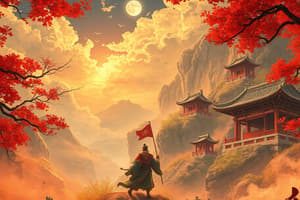Podcast
Questions and Answers
What role did the rivers and seas play in the culture of Ancient China?
What role did the rivers and seas play in the culture of Ancient China?
They provided clean water, fertile soil, and supported fishing and maritime exploration.
Describe the significance of Qin Shi Huang Di in the unification of China.
Describe the significance of Qin Shi Huang Di in the unification of China.
Qin Shi Huang Di unified China, standardized laws and measures, and initiated significant building projects.
How did Confucianism influence governance in Ancient China?
How did Confucianism influence governance in Ancient China?
Confucianism emphasized moral integrity and social harmony, shaping ethical governance.
What was the structure of society in Ancient China, and what were the main classes?
What was the structure of society in Ancient China, and what were the main classes?
What were the roles of men and women in Medieval European society?
What were the roles of men and women in Medieval European society?
Explain the feudal system's hierarchy in Medieval Europe.
Explain the feudal system's hierarchy in Medieval Europe.
What impact did the Crusades have on Medieval Europe?
What impact did the Crusades have on Medieval Europe?
How did everyday life for children differ between Ancient China and Medieval Europe?
How did everyday life for children differ between Ancient China and Medieval Europe?
Flashcards
Ancient China's Rivers/Seas
Ancient China's Rivers/Seas
Rivers and seas provided fertile land, fresh water, and resources for fishing, trade, and exploration in ancient China.
Ancient China Social Structure
Ancient China Social Structure
Ancient China had a hierarchical structure ordered by the emperor on top, who then delegated power to the Shi, Nong, Gong, and Shang classes (scholars, peasants, craftsmen, merchants).
Feudal System (Medieval Europe)
Feudal System (Medieval Europe)
A political and social system based on land ownership exchanged for loyalty and military service, creating a complex hierarchy in Medieval Europe.
Medieval Europe Kings
Medieval Europe Kings
Signup and view all the flashcards
Qin Shi Huang Di
Qin Shi Huang Di
Signup and view all the flashcards
Legalism (Ancient China)
Legalism (Ancient China)
Signup and view all the flashcards
Silk Road (Ancient China)
Silk Road (Ancient China)
Signup and view all the flashcards
Medieval Europe Everyday Life (Women)
Medieval Europe Everyday Life (Women)
Signup and view all the flashcards
Study Notes
Ancient China
-
Physical Features: Clean rivers and seas facilitated fishing and exploration; mountains provided strategic military advantage and valuable resources.
-
Social Structure: Dynasty-led; Emperor (head of state) with Mandate of Heaven; distinct social classes (scholars, peasants, artisans, merchants).
-
Law & Religion: Legalism emphasized strict laws and harsh punishments; Confucianism promoted social harmony and moral integrity; Taoism and Buddhism focused on harmony with nature and compassion.
-
Everyday Life: Men were primarily farmers; women were subordinate, fulfilling various roles; children's education varied based on gender.
-
Warfare & Customs: Internal conflicts (rebellion); external conflicts (expansion during Han Dynasty); reluctance toward warfare influenced by Confucian ideals; elaborate death rituals and beliefs in an afterlife.
-
Contacts & Consequences: Silk Road facilitated significant trade and cultural exchange; cultural legacies included inventions (paper, silk), art (porcelain), and architectural advancements.
-
Significant Individuals: Qin Shi Huang Di unified China, standardized laws, and oversaw significant infrastructure projects.
Medieval Europe
-
Way of Life: Feudal system: land exchanged for military service, establishing a hierarchy (Kings, Nobles, Knights, Peasants); Kings controlled land and maintained peace
-
Nobles: wielded significant power and controlled land
-
Knights: Provided security and participated in tournaments.
-
Commoners: Engaged in agriculture and craftsmanship.
-
Notable Developments: Crusades increased cultural exchange; architecture, predominantly cathedrals and castles, served both practical and religious purposes; crime and punishments varied and lacked consistency.
-
Spanish Conquest of Americas: Pre-Columbian societies had distinct social classes (nobility, commoners, slaves); military played a crucial role; city life varied based on social status.
-
Beliefs & Religion: polytheistic beliefs and rituals centered around maintaining cosmic balance, and temples were essential to religious practices.
Studying That Suits You
Use AI to generate personalized quizzes and flashcards to suit your learning preferences.




